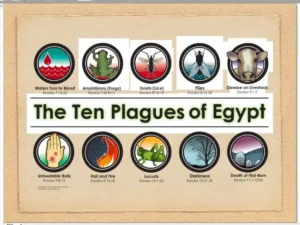
EDITOR’S NOTE: Ron Merrell and I are each other’s biggest cheerleaders. This article comes from a message he preached several years ago during a verse-by-verse expository series on the Book of Exodus. I loved it so much, I’ve been pestering him to convert his sermon notes into an article here for months now. Due to his incredibly busy pastoral schedule, he enlisted me to edit that sermon into what you are reading here. We finally have achieved ignition and life-off. I am confident you will be as blessed by what he has to say as I have been. — Steve
Introduction
Some things in our world and in pop culture today are unpopular and out of favor. Among them, we find a tremendous body of “things” concerning our Heavenly Father, especially the way He operates and certain facets of His character. Even though all those aspects aren’t generally accepted, I am still thankful for them. Popularity should never be the sole gauge by which we measure value — especially theologically.
We’re now going to delve into the Exodus story and discuss some of those disliked aspects. Tragically, even Christendom tends to shy away from them these days. So this will not be a “feel-good” message filled with verses on our hit-parade of what we like to read, hear, or even what I would like to teach on. Yet we can remain thankful as we lean into what’s going on here, granted that some of it is difficult to wrap our minds around.
That difficult topic is the 10 plagues God inflicted upon the nation of Egypt. Even if you’re not a follower of Jesus and haven’t been around church much, you’re probably familiar with the story. But let me sketch in some history for those of you who are unfamiliar with the details.
Setting the Stage
- The Jews started out as honored guests in Egypt due to their kinship with one of Jacob’s 12 sons, Joseph. Over a period of arduous years, he had risen from abject slavery to become Egypt’s prime minister and national savior (see Genesis 37,39-50).
- Jacob’s descendants had multiplied and prospered there until an envious and paranoid conspiracy-theorist of a pharaoh came along who had somehow come to the throne completely ignorant of Joseph’s virtues (see Exodus 1:8). He then had the satanically inspired idea to enslave the entire lot of them (see Exodus 1:11-14) rather than allowing them to continue peacefully prospering as they had for just over 400 years.
- Adding insult to injury, he also ordered Jewish midwives to kill all the male infants as a form of Hebrew population control. When the midwives refused to obey that ordinance, Pharaoh turned to the general Egyptian population and ordered them to do it.
- Through a combination of inspired Hebrew creativity and divine coincidence, Moses, a son of a Levite, escaped infanticide and was adopted by Pharaoh’s daughter. He was thereafter raised as an Egyptian prince. From extra-biblical records, it seems he was highly educated and skilled in the military arts. The rest of his development as a man of God is recorded in Exodus 2-6. By the way, please note Moses was 80 years old when he confronted Pharaoh, so don’t ever let anyone tell you that you are too old to do mighty exploits for the Lord!
- In short, the Hebrew children have been crying out to God for rescue literally for decades by this time and God has said, “Enough’s enough!” He proclaims, “Moses, I’m sending you in! To do that, you’ve got to go toe-to-toe with Pharaoh.”
- On top of being king of Egypt, Pharaoh was worshiped as a god himself. In the eyes of his nation and the known world at that time, Pharaoh was the land of Egypt, the most powerful nation in the world at this particular moment in history.
And God has just called Moses to go in and have a showdown.
- Beginning in Exodus Chapter 7 and ending in Chapter 12, God’s going to use a series of miracles to work on Pharaoh’s hard heart and bring about the freedom of His people from slavery.
- The first miraculous showdown took place when Moses ordered Aaron to throw down his staff and that piece of wood immediately became a serpent. Pharoah’s sorcerers performed the same miracle on the spot. Unfortunately for them, Aaron’s snake ate the magicians’s snake. But Pharoah wasn’t buying. (see Exodus 7:8-13)
- Beginning in verse 14 and ending in Chapter 12, God then inflicts a series of 10 plagues upon Egypt.
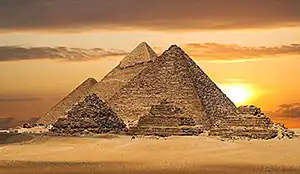
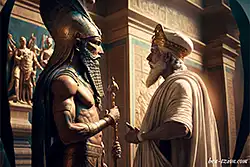
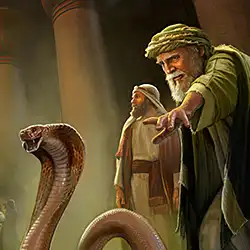
The First Plague
For the first one, God is going to turn the Nile River into blood. The significance of this is the Nile was the “lifeblood” of Egypt. The river made that nation the breadbasket of the Middle East for millennia, so much so the river itself was worshipped as a deity by the Egyptians for centuries. So from the opening salvo, God was calling into question their very national identity.
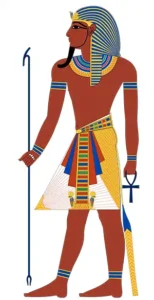 In verse 20, it says Moses and Aaron did just as the Lord had commanded in the presence of Pharaoh and his officials by raising his staff and striking the water in the Nile. All the water in the Nile was instantly turned to blood. Immediately, the fish in the river died. The river smelled so awful the Egyptians could not drink from it. The plague even affected river water which had been collected into containers. Though the Egyptians tried to dig for water elsewhere, they found nothing but more blood.
In verse 20, it says Moses and Aaron did just as the Lord had commanded in the presence of Pharaoh and his officials by raising his staff and striking the water in the Nile. All the water in the Nile was instantly turned to blood. Immediately, the fish in the river died. The river smelled so awful the Egyptians could not drink from it. The plague even affected river water which had been collected into containers. Though the Egyptians tried to dig for water elsewhere, they found nothing but more blood.
Similar to the staff-to-snake thing, Pharaoh’s magicians/sorcerers then created blood through their occult practices from water somehow found elsewhere. For each an every one of the remaining 9 plagues, they made some attempt to mimic what God was doing through Moses and Aaron. A couple of times, those charlatans even appeared to be somewhat successful. We don’t know if it was demonic powers counterfeiting them, or it was just an illusionist’s sleight-of-hand trick. But over time the magicians can’t keep up and their imitations prove either inferior to or powerless over God’s awesome might.
Tragically, Pharaoh’s heart was hard, and he would not listen to Moses and Aaron. As the Lord had said, Pharaoh turned around, went into his palace and refused to take any of this to heart. The Egyptians dug around the Nile for water to drink, because they could not drink the water from the river. The plague lasted for a week.
Rinse & Repeat
 A 2-part pattern emerges over the next handful of chapters.
A 2-part pattern emerges over the next handful of chapters.
- A plague
- The hardening of Pharaoh’s heart
God never repeats Himself because He wants to hear His own voice. Whenever something recurs in Scripture, we can take it to the bank He is communicating some principle(s) He wants us to not only take note of, but also trust and obey.
That especially goes for the plagues of Exodus. This plague/hardening duo is mentioned in every single one of the 10 instances detailed in the next several chapters. We can safely conclude from this that God wants to impress upon us something about the hardening of hearts.
The Purpose of the Plagues
So let’s explore that series of repetitions. Each of those plagues was a divine judgment upon the wicked nation of Egypt. If you study it out, each one specifically attacked the credibility of a Egyptian little-g god. By doing so, God was literally dismantling the religious pantheon of Egypt. He’s clearly demonstrating to anyone with the wit to pay attention how He alone is the One True God.Can I just say something real quick? Be careful what you ask for. Pharaoh’s already stubborn, and he’s saying, “Oh, no, I’m not!”
But the Lord told you to let His people go.
“Well, I don’t care what He says, because I don’t know Him!”
Oops!
As a consequence, the Lord is going to display Who He is while simultaneously demonstrating the gods Pharaoh worships have zero substance or power, not to mention that Pharaoh himself shouldn’t be worshiped as a god.
Teachable Moments
Yes, God is indeed using a series of harsh judgments to bring about the Israelites’ freedom. But closely coupled with this, God also has an underlying educational agenda for both parties. What do I mean by this?
There isn’t anything He can’t do far more excellently, far more quickly, and far more thoroughly than what any of us bozo human beings can bring to the table. When you think about it, God could have swooped down like a giant magic carpet to supernaturally rescue all 1 or 2 million of the enslaved Israelites at one swell foop — and there was no one on this planet who could have stopped Him. He could have just said, “All aboard the Exodus Express!” and zoomed them over to the Promised Land the same way He moved Phillip from Samaria to Azotus in Acts 8:39. The Almighty could have simply snapped his fingers or done the Bewitched nose wiggle, or whatever, and voilá!
But God wasn’t winging it; instead He was creating a carefully crafted teachable moment for both the Egyptians and God’s people through these judgments. He was instructing them over and over again Who He is: Almighty God.
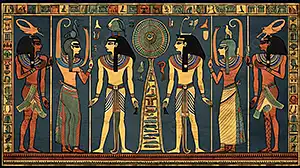 Both groups were going to have a front row seat, as it were, to God’s unlimited capabilities and the powerlessness of the inanimate and silent fake Egyptian little-g gods. This educational agenda would not only have a huge impact on Egypt, but would also start equipping the Israelites with a greater sense of how powerful their God truly is — and they were going to need that revelation heading into their emancipated future. But then simultaneously, these stories of what transpired there have traveled all around the world since then; this was indeed an education for all mankind. How crazy it is for all of us to be sitting here 4000-odd years later with God still teaching us about what He’s like through difficult, challenging, unpopular moves/circumstances.
Both groups were going to have a front row seat, as it were, to God’s unlimited capabilities and the powerlessness of the inanimate and silent fake Egyptian little-g gods. This educational agenda would not only have a huge impact on Egypt, but would also start equipping the Israelites with a greater sense of how powerful their God truly is — and they were going to need that revelation heading into their emancipated future. But then simultaneously, these stories of what transpired there have traveled all around the world since then; this was indeed an education for all mankind. How crazy it is for all of us to be sitting here 4000-odd years later with God still teaching us about what He’s like through difficult, challenging, unpopular moves/circumstances.
But I don’t want us to get hung up on the plagues and the judgments of God, even though that’s very clearly depicted here. Why? Because I not only see the 10 judgments/plagues God initiates, but I also see God simultaneously giving Pharaoh and the Egyptian people 10 chances to repent and get their religious act together.
God’s Patience with Us
You ever stop and think how many chances God gives to you? You ever pause and ponder about how many times you haven’t received the just consequences for particular choices you’ve made? You ever contemplated about just how gracious and patient and long-suffering God is with you or with other people? Man, he’s put up with a lot in me!
As I read this passage, yes, there’s some harsh judgments coming here for a good purpose. But I also see our gracious and merciful Heavenly Father offering 10 “second-chances” to an incredibly wicked man. Pharaoh is honestly like Hitler a hundred or thousand times over, yet God is giving this man 10 chances to turn around, 10 opportunities to end the plagues. For 6 of them, Pharaoh actually gets a heads-up they were about to happen.
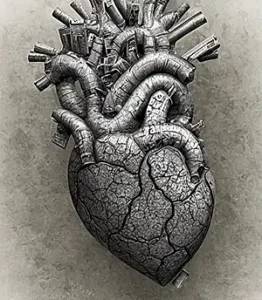 Has God ever warned you about something, whether through His Word or a friend or a set of circumstances? It’s like He’s saying “Hey, I’m not bringing the consequences just yet, but I’m putting this on your radar. If you keep going this direction, it’s not going to be great for you.” So he warns you. That’s built into His grace. For 6 of the 10 plagues He gave Pharaoh a clear warning. That, to me, is an evidence of God extending grace, even in the midst of the justice He’s fixing to launch.
Has God ever warned you about something, whether through His Word or a friend or a set of circumstances? It’s like He’s saying “Hey, I’m not bringing the consequences just yet, but I’m putting this on your radar. If you keep going this direction, it’s not going to be great for you.” So he warns you. That’s built into His grace. For 6 of the 10 plagues He gave Pharaoh a clear warning. That, to me, is an evidence of God extending grace, even in the midst of the justice He’s fixing to launch.
There’s a framework in Scripture as God deals with His wayward creation. We see this same pattern in the Exodus story. You’ve probably experienced this sequence in your own life. Here it is:
- God reveals Himself and His desires.
- He then gives us some time to sort out what we’re gonna do, how we’re gonna respond to what He’s revealed.
- Then God moves. He kicks His plan, His promises, His purposes, into another gear. Sometimes it’s game over. Others, it’s fifth gear, sixth gear and we’re really going to take new ground here.
His pattern is: “I’m going to reveal something to you, then I’m going to give you some time to assimilate it, and then after that time has expired, we’re on the move!” And that’s what’s going on here. I love that pattern! His ultimate goal is Pharaoh recognizing Who is The Almighty and then admitting to all concerned that YHWH is indeed God, and I’m not.
Now when you and I encounter opportunities where God reveals Himself to us, for some of us, that’s humbling. We exclaim, “Oh my goodness, God, you are powerful. You are strong. I’m not God, and thank You that I’m not! When others of us find out what God is saying (who He is and what He wants from us), they harden their hearts. In the case of Pharaoh here, we see his response is not to humble himself, allowing God to soften his heart with divine revelation, but rather a hardening. And so the plagues became a repetition, and Pharaoh’s repeated hardening of his heart was his response.
Chapters 4-14 contain 20 references to Pharaoh’s heart. 10 of the hard-heartedness references in those chapters are ascribed to Pharaoh. Pharaoh either hardened his heart or Pharaoh’s heart was already hard. 10 of the 20 references Pharaoh was hardening his heart. The other 10, it says the Lord God is hardening Pharaoh’s heart. In the first 5 plagues, Pharaoh is hardening his own heart. In these instances, Pharaoh is making the choices and it’s Pharaoh’s heart that’s hard (Pharaoh actively hardening his own heart). Then for the majority of the back half of the plagues, it’s the Lord hardening Pharaoh’s heart.
That’s helpful, instructive, because God isn’t going violate our free will; He’s actually permitting us to lean into it. In this case, Pharaoh already had a hard heart. Pharaoh already had stubbornness. Pharaoh already had an evil and disgusting plan in mind, so God gave him over to that. So along about the seventh plague, God has started to harden Pharaoh’s heart.
The 7th Plague
We read about the seventh plague in Exodus 9.
By this time, The Egyptians had already experienced 6 really awful plagues. Some were major annoyances attacking the comfort of the Egyptian people. Others have directly attacked the financial stability of the nation. All of them have been attacking those false Egyptian little-g gods.
Now we have this interesting plague of hail. But it’s not your run-of-the-mill, garden-variety hail. It’s fiery hail.
 Now, I don’t know if you’ve ever seen or experienced that kind of thing; I certainly haven’t! As we all know, normal hail is a rain of ice chunks ranging from pellet-sized to the diameter of softballs. Fire and ice don’t typically go together. In fact, I cannot even recall an instance of even fiery hail by itself apart from the account of Sodom and Gomorrah in Genesis.
Now, I don’t know if you’ve ever seen or experienced that kind of thing; I certainly haven’t! As we all know, normal hail is a rain of ice chunks ranging from pellet-sized to the diameter of softballs. Fire and ice don’t typically go together. In fact, I cannot even recall an instance of even fiery hail by itself apart from the account of Sodom and Gomorrah in Genesis.
But in this particular case, fire is raining down simultaneously with massive hail. Some scholars say it was actually like the fire was inside the ice. No matter how you cut it, this is something that no little-g god could ever pull off; the water and fire gods didn’t just take a notion and put their heads together to create this joint spectacular.
This is something only the One True God could ever pull off. And at this point 7 plagues into this ordeal, it appears Pharaoh’s heart starts to waffle a little bit. He’s already been hardening it on his own; now the Lord appears to amping things up a bit. Maybe there’s a glimmer of hope here.
In Exodus 9:27, we witness a remarkable change. Pharaoh sends for Moses and Aaron and he admits, “I have sinned this time. The Lord is the righteous one, and my people and I are the guilty ones.” Man, that’s quite a confession!
It appears to be a complete change of heart, doesn’t it? He says, “There has been enough of God’s thunder and hail. I will let you go. You don’t need to stay any longer.” It’s first and goal for the Israelites. The hail ceases.
But what initially appeared to be an honest confession turns out to be just another of Pharaoh’s mind games. His heart may have softened for a moment, but as soon as the consequences stopped, Pharaoh’s heart goes back to being hard, and he says, “Forget it. I know what I just said, but I didn’t mean it. I’m not going to let your people go. He completely backpedals.
From this point on, when it comes to Pharaoh’s heart, God’s the only one doing the hardening. From this confession and betrayal forward, God is more and more active in the hardening of Pharaoh’s heart as the plagues escalate.
The Issue of Human Free Will
 I have had a hard time with this, because it sounded to me like God was taking away Pharaoh’s free will. This question comes up an awful lot in debates with skeptics. If Pharaoh wanted to do the right thing and God wouldn’t let him, how could that possibly be fair or just? I mean, what good God does that kind of thing? I’m no expert on this, but you can go do some phenomenal study on your own. I’ve discovered for myself it’s this rich, deep, well, that just keeps getting better and better, but you’ll have to embark on that study on your own because time and space preclude my giving you the shortcut answers. But I will tell you this: as I was studying these chapters this last couple of weeks, I actually found there are two different Hebrew words being used to describe the heart hardening.
I have had a hard time with this, because it sounded to me like God was taking away Pharaoh’s free will. This question comes up an awful lot in debates with skeptics. If Pharaoh wanted to do the right thing and God wouldn’t let him, how could that possibly be fair or just? I mean, what good God does that kind of thing? I’m no expert on this, but you can go do some phenomenal study on your own. I’ve discovered for myself it’s this rich, deep, well, that just keeps getting better and better, but you’ll have to embark on that study on your own because time and space preclude my giving you the shortcut answers. But I will tell you this: as I was studying these chapters this last couple of weeks, I actually found there are two different Hebrew words being used to describe the heart hardening.
The first Hebrew word for hard or hardening means to make heavy. If you unpack it a bit more, it means to have a stubborn heart. And that’s really what we are seeing, right? Pharaoh says, “Oh, no, God, I know who you are. I know what you’re doing. I just don’t want anything to do with it.” He’s got a heart that’s been made heavy because he made that way. He’s just being stubborn.
Have you ever had a stubborn heart? Have you ever known what’s right and what’s wrong and gone ahead and done the wrong thing anyway. You ever had those moments where you just go, “You know what? I don’t want to obey. I don’t want to do what you want me to do?” Yeah, we all have. This is what Pharaoh was doing for the first 6 plagues.
But from this point on, when the Lord is hardening Pharaoh’s heart, the Word uses a different Hebrew word for hardening. This word doesn’t mean “to make stubborn.” This one means to make strong. So when God hardens Pharaoh’s heart from this point on, he’s actually making Pharaoh’s heart strong. It’s like He’s giving Pharaoh greater courage to rebel.
What we’re left with is this: God did not remove Pharaoh’s free will, but instead enhanced his free will. God knew where Pharaoh’s heart was at. God knew precisely what Pharaoh wanted to do deep down inside the desires of his heart.
In that moment of waffling, God is saying, “I get where you want to go, and I even get your even waffling a little bit, I’m actually going to make your heart stronger to pursue what you really want to do. I’m going to allow you to go the direction you really want to go. It’s going to be for My glory and it’s going to have huge consequences. But from this time forward I’m going to put your free will on steroids.”
That’s different. Frankly, it terrifies me.
How That Spins Out in the Modern Era
The story now starts to bleed into where I first started in this article. I stated there’s a bunch of unpopular stuff today about the character and the nature of God; this story touches on a bunch of them. Here’s three unpopular characteristics about God nowadays.
-
The Judgments of God
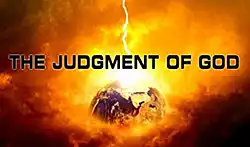 That’s really out of favor these days; no one likes to talk about it. Even folks in the church would prefer not to hear about it. But people who don’t know God? They definitely don’t want to hear about the judgments of God.
That’s really out of favor these days; no one likes to talk about it. Even folks in the church would prefer not to hear about it. But people who don’t know God? They definitely don’t want to hear about the judgments of God. But I’m forced to remind us our Almighty God is a God of justice. He is the only holy, righteous, perfect, good One in existence. Because He possesses all knowledge, He knows everything about us, including our innermost thoughts and desires (even those we’ve suppressed into our subconscious). On top of that, He knows exactly what he’s doing; He always has the perfect plan, regardless of whether we see it, agree with it, or even comprehend it’s in play.
Now let’s also circle back to the fact Pharaoh had mandated the infanticide of male Hebrew children by the thousands — if not tens of thousands. He had also forced millions of people into brutal slavery and interfered with their ability to worship. So no one can raise that tired old trope about “why do bad things happen to good people?” because Pharaoh was anything but a “good people!”
Many of us church folk cheer God on from the cheap seats in this kind of situation. We love God passing judgment on those we consider to be wicked, or we disagree with or even sometimes those who are simply not “of us.” We love the judgments of God until we’re the one caught in the crosshairs, right? And as soon as it’s us on the receiving end, we’re like, “No way! That’s not right! Go ahead and judge everybody else, just not me!”
-
The Methods of God
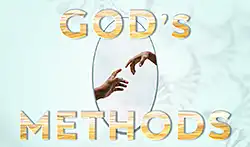 Another detested thing today is how God carries out His plans by any and all means He deems necessary. God’s simply going to do whatever he needs to do to accomplish his purpose. That’s totally loathed. But again, I have to remind us of the good side of that: there are no rogue nations. There are no evil, megalomaniac dictators who are going to rise up and be able to thwart God’s promises or purposes (see Psalm 37). No human being is able to obstruct or impede God’s plans.
Another detested thing today is how God carries out His plans by any and all means He deems necessary. God’s simply going to do whatever he needs to do to accomplish his purpose. That’s totally loathed. But again, I have to remind us of the good side of that: there are no rogue nations. There are no evil, megalomaniac dictators who are going to rise up and be able to thwart God’s promises or purposes (see Psalm 37). No human being is able to obstruct or impede God’s plans.He will not let that happen. He will reveal Himself. He’ll allow quite a bit of time to go by with a whole lot of patience to see how folks are going to respond, and then he’ll kick it into a different gear. On one hand, He may bring an abrupt end to it all. On the other, He may accelerate the pace for a bit with things getting worse before they get better. But we clearly know from Scripture He is someday going to bring all of the junk and all of the hurt and all of the hardship you and I are experiencing at this moment in history to a permanent end.
I believe we’re walking in that phase of God’s pattern where He is revealing a whole bunch about Himself. Jesus is still yet to return, but I think we’re well on our way. We’ve got some time right now. In that time, God’s demonstrating a ton of patience and grace and mercy. His end goal is to bring as many into His Kingdom as He can before The End. We don’t when The End will occur in time, but I can definitely tell you the single condition required for it to happen: the very last soul on earth who will ever receive salvation utters by faith the confession: “Jesus, I surrender. I believe God raised you from the dead. Be my Lord!” Only God knows who that is, where he/she lives, or when it will occur, but occur it will. Then blammo — we’re outta here!
There’s something oddly comforting about a God who’s not going to let a rogue nation or a megalomaniac run away with His plans. That is, it’s comforting unless you’re that megalomaniac or rogue nation; then, not so much!
-
The Unchanging Standards of God
 The third hated thing is how God never budges from what He has determined to be good and evil. We selfish humans don’t like boundaries, limits, fences. We want to do what we want when and where we want to do it and with/to whom we want to do it. We cherish the idea of free will and we don’t want anyone or anything impinging upon that. Satan then deceives our rebellion by labelling that “freedom.”
The third hated thing is how God never budges from what He has determined to be good and evil. We selfish humans don’t like boundaries, limits, fences. We want to do what we want when and where we want to do it and with/to whom we want to do it. We cherish the idea of free will and we don’t want anyone or anything impinging upon that. Satan then deceives our rebellion by labelling that “freedom.”And God’s not going to break our free will; He still gives us a choice. It’s not a widely-accepted or -acknowledged concept nowadays that He allows us to chase after something which isn’t Him, but He does — up to a point. That point is where we finally crash head-long into the Rock of Ages, thus bringing our self-lordship in that area to an ignominious end. In other words, He constantly presents us with a choice between humility or humiliation. We can learn by listening to His Spirit or we can learn through the trauma of our painful consequences.
God loves us way too much to force us to follow him, yet at the same time, he knows where your heart’s at, and if we just want to keep going a certain direction, there might come a time where He actually hardens your heart. In other words, He might, as I said earlier, put your free will on steroids. He might say, “Okay, I get it. You don’t want me. You don’t want my way. So I’m going to give you the courage to go for it!”
He does that, so that you and I will, as the Prodigal Son did, come to the “end of ourselves.” That’s when we finally see the little-g gods we’ve been worshiping — including our being in the driver’s seat! — as the false idols they truly are. Truthfully, we suck at being gods.
Game Over!
 To conclude our story, the Lord gives Pharaoh over to what his heart really wants to do all the way up through the final plague: the death of every first-born Egyptian, man and beast. And we see God’s provision for God’s people in the midst of that plague.
To conclude our story, the Lord gives Pharaoh over to what his heart really wants to do all the way up through the final plague: the death of every first-born Egyptian, man and beast. And we see God’s provision for God’s people in the midst of that plague.
I’m thankful for a God who will eventually say “game over!” Game over for Pharaoh occurred in his chariot mired in the seabed in the middle of a parted Red Sea because he could never shake his delusion he was indeed a god.
There was a “game-over” moment for the Jewish people themselves a few thousand years later when the Romans destroyed Jerusalem in 70AD and razed the Second Temple to the ground. There’s going to be another “game-over” for all mankind when Jesus returns in the clouds of glory to establish His eternal government on the earth once and for all. I’m glad that we’re not stuck just in “this.” I’m glad “this” will come to an end and there’s something a whole lot better coming which ushers in the kingship of God in a whole new way.
In Conclusion
The Bible repeatedly states our heart is incredibly important. It’s referred to between 800-900 times in the Scriptures. The heart in these references concern your emotions, your intellect, your will, your spiritual life. It’s the inner you. Your heart is the part of you that drives you. Proverbs 4 says, “Above all else, guard your heart, for it is the wellspring of life.” Another translation reads, “Guard your heart, because everything you do flows from it.” Your heart determines every aspect of your life, from what you say to what you do.
Do you have a soft heart today? Do you have a broken, contrite heart today? Or do you have a numb heart today? Does your heart feel kind of empty, or does your heart feel beat up? Or is your heart full. Is it an encouraged heart?
Or would you say, “You know what, I think my heart is hard, at least part of it.” If so, then in humility, you can just ask him to work on you. Man looks at the outward appearance, but God looks at the heart. Jeremiah said the heart is deceitful above all else, only God knows it. In Psalm 51, David prays, “Create in me a clean heart, O God and renew a right spirit within me.” Again, David prayed in Psalm 139: “Search me, O God, and know my heart.”
What if Pharaoh had done that?
Steve’s Addendum
Back when I first heard Ron preach this message, his comments about God strengthening Pharaoh’s already-hardened his heart completely resonated with me. I had personally experienced God putting my own heart-hardening process on steroids during my mid-life crisis and its aftermath during 2001-2008. I’ve detailed that experience in two articles, “The 4 D’s of the Devil and Humility.
Back before I abandoned my late-ex-wife and son in Florida, the Lord clearly spoke the following to me: “I am for you, not against you. I will be with you as you go and protect you. This will not lead to poverty.”
I misinterpreted that to mean He was going to bless what I was about to do.
[LOUD BUZZER] Sorry, wrong answer! Thank you for playing!”
Instead, He was reassuring me the wayward journey I was about to embark upon would conform to Jeremiah 29:11. In the midst of my rebellion, He was letting me know He had me, His plan was in place, and it would ultimately end well. It would completely transform my walk with Him, my IT career, and my ministry. That process required my undergoing several years of frustration, many financial struggles, much emotional pain, accompanied by more than a few spiritual comeuppances. He was simply assuring me beforehand I wouldn’t eventually find myself drowning in the middle of my own Red Sea. Apart from His grace and mercy, by all rights I should have ended up destitute and homeless, living in a cardboard box under an overpass somewhere.
God is good!
Heed Ron’s message here as well as my articles. Do not presume upon God’s grace. Keep your heart soft and pliable.
In a word: humble.
Thanks for reading!

